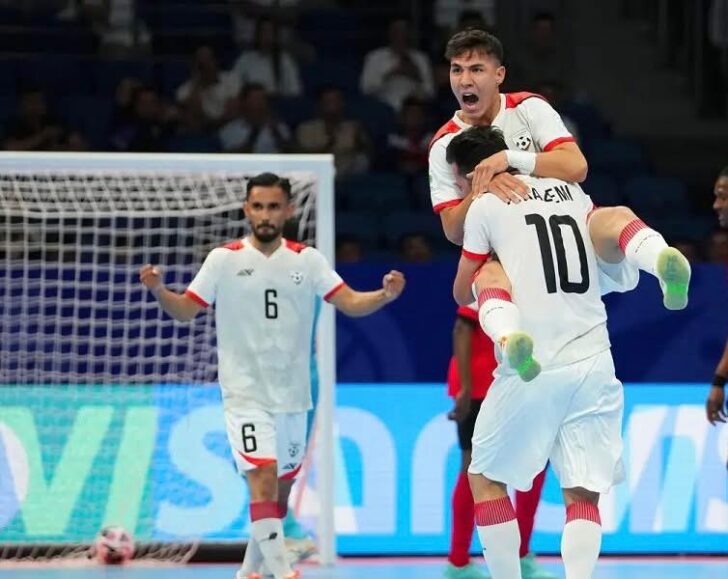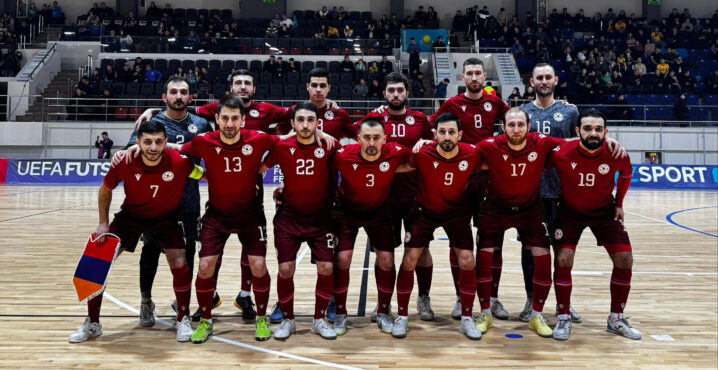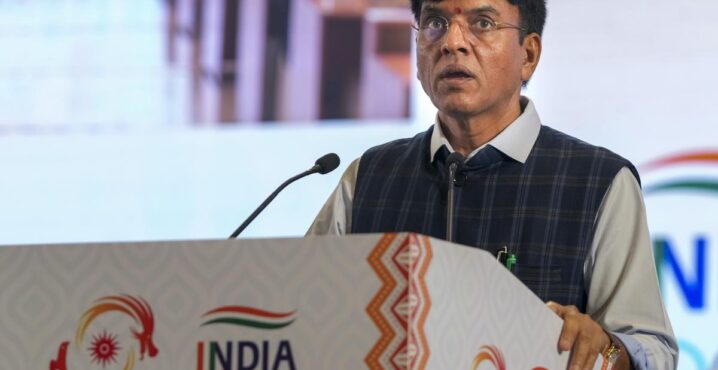Estimated reading time:10 minutes, 25 seconds
From underdogs to serious contenders, Afghanistan’s national futsal team turns heads in Brazil and Morocco with resilience, talent, and a vision for global impact.
Once dismissed as a developing futsal nation with limited resources and no professional league, Afghanistan’s national futsal team is rapidly rewriting its story. At the recent Copa BETesporte Intercontinental de Seleções in Brazil — and shortly afterward at a four-nation tournament in Morocco — the team didn’t just show up. They battled world-class opponents, earned critical wins, and demonstrated that ambition and grit can challenge even the most established futsal powers. With a new generation of fearless players and a visionary coach, Afghanistan is on a mission to claim its place among futsal’s elite.
(Main picture: Afghanistan defeats Greenland in the Copa BETesporte Intercontinental de Seleções, source of the image: amu.tv)
Battling Giants in Brazil
While Afghanistan earned widespread praise for their performances against Brazil and Iran, their tightly contested games with Greenland warrant reflection. Despite defeating Greenland twice — once 5-4 and again in a penalty shootout after a 2-2 draw — these were matches many expected them to win more comfortably. The fact that Greenland, a team far less experienced on the international stage, was able to push Afghanistan to the limit raises important questions about consistency. For a team aspiring to break into futsal’s top tier, delivering strong performances against all opponents, not just elite ones, will be crucial. These matches underscore that Afghanistan’s challenge now lies not just in rising to the occasion against giants, but in maintaining that high level against any opposition.
Afghanistan’s national futsal team has taken a bold step forward on the global stage, turning heads with a string of impressive performances at the Copa BETesporte Intercontinental de Seleções in Brazil. The four-nation invitational brought together some of the sport’s most formidable names: hosts Brazil, Asian champions Iran, and Afghanistan — the surprise package of the tournament. Greenland joined the competition as a last-minute replacement for France.
Nicknamed the Lions of Khorasan, Afghanistan made their intent known from the very beginning. In their opening match, they edged out Greenland 5-4 in a high-octane battle that revealed the team’s attacking flair and mental toughness. But it was in the next two matches that Afghanistan truly earned global respect.
Against Brazil, the most decorated team in futsal history, Afghanistan held their own. Although the final score read 1-4, the match showcased their ability to absorb pressure and launch disciplined counterattacks. Playing in front of 4,000 fervent Brazilian fans, they committed few errors, and the match remained competitive for much of its duration.
The encounter with Iran, Asia’s highest-ranked futsal nation and a World Cup finalist, was a revelation. Trailing 3-1 at halftime, Afghanistan roared back with goals from Akbar Kazemi and Hossein Mohammadi, pushing Iran to the brink in what many considered the match of the tournament. The final score of 4-3 in Iran’s favor belied how close Afghanistan came to a monumental upset.
Head coach Majid Mortezaei later remarked, “It was a very good game… we achieved our goals in both games against big teams like Brazil and Iran,” expressing pride in how his players rose to the challenge.
Afghanistan capped off their campaign by facing Greenland again in the third-place playoff. Tied 2-2 after regular time, the match went to penalties, where Afghanistan held their nerve and secured a spot on the podium — a historic achievement that added substance to their growing reputation.
| Match | Result |
| Afghanistan vs Greenland (Group) | 5 – 4 W |
| Afghanistan vs Brazil (Group) | 1 – 4 L |
| Afghanistan vs Iran (Group) | 3 – 4 L |
| 3rd Place: Afghanistan vs Greenland | 2 – 2 (W on penalties) |
A Thriller Against Iran: “Never Quit”
One often overlooked aspect of the Afghanistan-Iran clash was the remarkable camaraderie between the players. Many Afghan futsal players compete professionally in Iran, and during the match, they could be seen calling each other by first names and even embracing between plays. Coach Mortezaei addressed this dynamic, saying, “Many of our players know each other well from the Iranian league. There was a great atmosphere on the pitch — full of respect and familiarity. No one should misunderstand the competitive nature of the match for hostility.”
This shared experience adds a compelling layer to the rivalry: two nations intertwined through sport, producing moments of both fierce competition and mutual respect. It also highlights how Afghanistan’s development has been shaped in part by opportunities abroad, particularly within neighboring Iran’s more established futsal ecosystem.
Among the tournament’s many narratives, Afghanistan’s near-upset of Iran stands out as a defining moment. Iran, with decades of regional dominance and a deep tactical repertoire, was expected to win comfortably. But what unfolded was a tense, dramatic contest that showed how far Afghan futsal has come.
The game was played under difficult conditions for Afghanistan. Their match against Brazil had concluded just 11 hours prior, giving them little time to rest, recover, or prepare. Iran, meanwhile, came in fresh. Yet from the opening whistle, Afghanistan displayed bravery and cohesion.
Akbar Kazemi, already becoming the face of Afghan futsal, scored their first-half goal to keep hopes alive. In the second half, Kazemi added another, and Hossein Mohammadi found the net as well, as Afghanistan dominated stretches of play and put Iran on the back foot.
Despite a late red card to Kazemi that reduced them to four men, Afghanistan continued to press, creating several late chances that nearly forced extra time. Coach Mortezaei lamented the scheduling imbalance, noting, “Maybe if we had rested more, we would have had a different result.” But the true takeaway was not the loss — it was how valiantly the team fought.
Goalkeeper Mohammad Javad Safari made several world-class saves, while the defense, anchored by Mehdi Norouzi, repeatedly repelled Iran’s attacks. The second half ended 2-1 in Afghanistan’s favor, and though the aggregate result was a narrow defeat, it felt like a turning point.
Coach Mortezaei: Architect of Ambition
Another influential figure praising Afghanistan’s rapid progress is Alireza Abbasi, a prominent name in global futsal science and psychology. Abbasi has emphasized that what sets this team apart is not only their tactical evolution but their growing psychological strength and mental resilience. He believes that integrating advanced sports science — from recovery and conditioning to performance psychology — will be key to sustaining and accelerating Afghanistan’s development.
“The Afghan team may not have the infrastructure of Brazil or Spain, but they are building something equally powerful — a mindset,” Abbasi stated. “Their hunger and cohesion give them an edge that can be further enhanced with mental coaching, injury prevention strategies, and structured performance analysis.”
Abbasi and others in the futsal science community argue that this is a prime moment for Afghanistan to invest in a more structured approach to sports science — including data analytics, individualized recovery protocols, and cognitive training — especially given the physical and emotional demands of facing elite international opponents in rapid succession.
Coach Mortezaei, known for his forward-thinking philosophy, has already taken steps in this direction. His approach emphasizes psychological preparedness as much as tactical execution, and the results in Brazil and Morocco suggest this blend of passion, planning, and sports science is paying off. Behind this resurgence is Majid Mortezaei, the Iranian-born coach whose vision has reshaped Afghan futsal. Known for his tactical acumen and player development, Mortezaei has transformed a once-overlooked squad into a competitive, cohesive unit.
Despite setbacks — including visa delays that shortened their prep time in Brazil, and injuries to key players like Hamidreza Hosseini and Omid Ghanbari — Mortezaei kept his team focused. “We played with all our strength,” he said, praising the squad’s resilience.
His goals are audacious: top 4 in Asia, top 10 globally. But he is already backing those ambitions with action. Afghanistan has recently participated in a prestigious four-nation tournament in Morocco, where they faced Portugal, China, and Morocco. Although they lost to Portugal, they bounced back with an emphatic 6-2 victory over China, finishing third. The team will continue its international calendar with matches against elite sides, including Morocco, Portugal, and Russia.
Rising Stars and Key Contributors
Afghanistan’s recent progress has not gone unnoticed on the international stage, and now its players are beginning to attract global attention. Mehdi Norouzi, the captain and defensive leader, recently signed a six-month contract with the Gol team in the French Premier Futsal League, becoming the first Afghan futsal player to compete professionally in France. This landmark move underscores his individual excellence and reflects the broader recognition of Afghan talent abroad.
Similarly, Reza Hosseinpoor, another standout from Afghanistan’s World Cup campaign, has joined Iraq’s Premier Futsal League following his breakout performances. Omid Ghanbari has also been reported to be playing in Iraq, and Farzad Mohammadi is plying his trade in Sweden’s Ettan League, adding further evidence of Afghan players branching out into competitive international environments.
Afghanistan’s squad is loaded with players who have seized the spotlight:
- Mehdi Norouzi (#3): The captain and defensive anchor. Calm under pressure, a vocal leader.
- Akbar Kazemi (#14): The team’s top scorer and emotional spark. His goals against Iran turned him into a national hero.
- Mehran Gholami (#8): Midfield maestro with sharp passing and creativity.
- Mohammad Javad Safari (#1): Goalkeeper with sharp reflexes, critical saves, and composure under fire.
- Omid Ghanbari (#11): A dynamic pivot whose absence in the final match due to injury was keenly felt.
Others like Hossein Mohammadi and Hamidreza Hosseini added depth and grit. Most players honed their skills in Iran’s pro leagues due to the lack of a structured domestic system in Afghanistan. Their shared experiences have fostered chemistry and confidence.
No League, No Limits
Afghanistan’s rise is all the more remarkable given the absence of a professional futsal league. With limited infrastructure, no year-round domestic competition, and modest training facilities, the Afghan players have had to rely on pure determination and regional opportunities.
Local tournaments and short AFF-run championships are the norm, but many players compete abroad — especially in Iran — to maintain their edge. The team’s arrival in Brazil was complicated by travel issues, with players touching down just hours before kickoff. And yet, they performed with the composure of seasoned veterans.
This perseverance resonates deeply at home. Social media is awash with messages of pride and encouragement. Young players are inspired. In a nation facing ongoing hardship, the futsal team has become a rare beacon of unity and aspiration.
Challenging the Old Guard
The traditional futsal hierarchy — Brazil, Spain, Argentina, Portugal — remains strong. But nations like Morocco, Ukraine, France, and now Afghanistan are pushing the boundaries.
Afghanistan’s journey to the 2024 FIFA Futsal World Cup was already historic: wins over Iraq and Kyrgyzstan in qualifying; a victory over Angola in the group stage; a valiant 2-1 loss to Argentina; and a tight extra-time battle with Paraguay in the Round of 16. From debutants to top 16 in the world, Afghanistan proved they belonged.
Now, with every close match and growing invite list, they are redefining expectations. Even Iran’s legendary coach Vahid Shamsaei has acknowledged their progress. This is no longer a Cinderella story — it’s a movement.
From Underdogs to Contenders
Afghanistan’s futsal story has evolved. Once seen as underdogs, they now play like contenders. Their performances in Brazil, Morocco, and on the World Cup stage reveal not only talent, but tactical growth, belief, and unity.
With a young average age of just 22, a driven coaching staff, and an unbreakable spirit, Afghanistan is determined to keep rising. As Coach Mortezaei said: “Asia must believe that there is still a power called Afghanistan in futsal.”
The world is watching. And the Lions of Khorasan are just getting started.
Organ Donation
Futsal Focus is a supporter of Dáithí Mac Gabhann and his family’s campaign to raise awareness of Organ Donation. We encourage our readers to learn more about Organ Donation: https://www.organdonation.nhs.uk/
Futsal Focus
You can read more articles about International Futsal by going to the top navigation bar or by clicking here
If you like this article and would like to keep updated on Futsal news, developments, etc. You can now follow Futsal Focus via Google News. By following our page which will send you an alert as soon as we publish an article. Please click here and follow us on Google.
You can also keep updated on Futsal news, developments by submitting your email below in the Subscribe to Futsal Focus option.
Follow Futsal Focus by clicking on Facebook, Twitter, or Instagram or on the social media buttons on the website



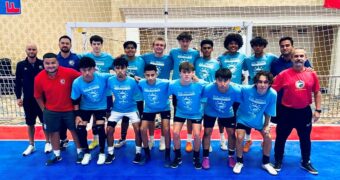



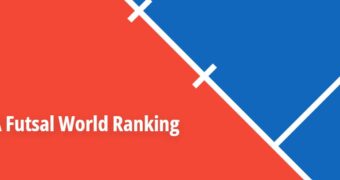








![Validate my RSS feed [Valid RSS]](https://www.futsalfocus.net/wp-content/uploads/2020/01/valid-rss-rogers.png)

